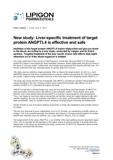New study: Liver-specific treatment of target protein ANGPTL4 is effective and safe
Inhibition of the target protein ANGPTL4 lowers triglyceride and glucose levels in the blood, according to a new study conducted by Lipigon and its Dutch partners. Targeted treatment of the liver avoids known side effects that might otherwise occur if the whole organism is treated.
The study, published in the Journal of Lipid Research, shows that silencing ANGPTL4, the target protein for Lipigons most advanced drug candidate Lipisense, lowers triglyceride and glucose levels in the blood in a mouse model. Furthermore, the animals were protected from obesity and fatty liver. The results confirmed what was expected based on genetic data from humans.
The study used an antisense oligonucleotide, ASO, to silence the target protein. An ASO is a short DNA/RNA sequence that binds complementary to a genes mRNA and prevents the cells from making the protein. Lipigons drug candidate Lipisense is the same type of ASO targeting human ANGPTL4.
The study also shows that the risk of lymphatic side effects is avoided by Lipisense being targeted and mainly absorbed in the liver. Previous studies have shown that lymphatic side effects can be a problem if ANGPTL4 is eliminated throughout the body.
"ANGPTL4 has been a tainted target ever since the first whole-body knockout studies of ANGPTL4 were presented, showing severe side effects on the lymphatic system. These studies were quite extreme, and I have always believed that ANGPTL4 could be a good target for drug development. Thus, I am happy to have been able to disrupt this old doctrine using the Lipigon approach with liver-specific targeting. We saw no lymphatic side effects in our study, yet the positive treatment effects were remarkable," says Dr. Sander Kersten, professor at Wageningen University, the Netherlands.
Sander Kersten is one of Europes leading researchers in molecular metabolism and scientific advisor to Lipigon.
"We are very fortunate to have collaborators such as Dr. Kersten, an outstanding scientific advisor to Lipigon. This is an excellent example of academia and industry in Europe working together for mutual benefit and, hopefully soon, for patients use, "says Stefan K. Nilsson, CEO of Lipigon.
The target protein in the study, ANGPTL4, is an inhibitor of the lipid-splitting enzyme lipoprotein lipase (LPL). LPL is essential for fat regulation in the blood, where its primary function is to break down the triglycerides in the blood. By preventing the bodys production of ANGPTL4, lipoprotein lipase activity increases, and blood fats decrease.
After four injections of ANGPTL4-ASO, ANGPTL4 levels were inhibited, leading to higher LPL levels and decreased triglyceride and glucose levels in the blood.
"Overall, these data indicate that ASO treatment targeting ANGPTL4 effectively reduces plasma triglyceride levels in mice without causing safety concerns," says Dr. Sander Kersten.
The researchers also measured lower cholesterol in total, lower LDL cholesterol, lower serum amyloid A, a marker for inflammation, and lower liver triglyceride levels. They saw no significant difference in the liver enzyme plasma alanine aminotransferase, suggesting that Lipisense is well tolerated in animals.
"Additionally, we also saw a reduced food intake, reduced weight gain, and improved glucose tolerance. This is promising for the future, as there may be uses for other indications, for example, people with diabetes who suffer from elevated triglycerides and glucose in the blood", says Dr. Sander Kersten.
These effects reflect those previously seen in humans with alterations in the ANGPTL4 gene, which is associated with a reduced waist-hip ratio, a reduced risk of type 2 diabetes, and coronary artery disease.
Silencing ANGPTL4 via antisense oligonucleotides effectively reduces plasma triglyceride and glucose levels in mice without causing lymphadenopathy. Mingjuan Deng, Elda Kutrolli, Anne Sadewasser, Sven Michel, Masoumeh Motamedi Joibari, Frank Jaschinski. Gunilla Olivecrona, Stefan K. Nilsson, Sander Kersten, Journal of Lipid Research, June 2022
About Lipisense
The drug candidate is an RNA therapeutic that prevents the cells from producing the disease-promoting target protein ANGPTL4 by destroying the protein-coding RNA before the target protein has been formed. The target gene has a strong genetic association with plasma lipid levels and related diseases like type 2 diabetes and cardiovascular disease.
For more information, please contact:
Stefan K. Nilsson, CEO, Lipigon
Email: [email protected]
Phone: +46 705 78 17 68
About Lipigon
Lipigon develops novel therapeutics for patients with lipid metabolism disorders. The company is based on over 50 years of lipid research at Umeå University, Sweden. Lipigons initial focus is on orphan drugs and niche indications, but in the long term, the company will have the opportunity to target broader indications in the area, such as diabetes and cardiovascular disease. Lipigons pipeline includes four active projects: the RNA-drug Lipisense for treatment of hypertriglyceridemia; an RNA-drug for treatment of acute respiratory distress syndrome; a gene therapy treatment for the rare disease lipodystrophy, together with Combigene AB (publ); and a small molecule program for the treatment of dyslipidemia in collaboration with HitGen (Inc).
The companys share (LPGO) is traded on the Nasdaq First North Growth Market. Certified Adviser is G&W Fondkommission, email: [email protected], phone: +46 8 503 000 50.
Om Lipigon
Lipigon Pharmaceuticals AB utvecklar nya läkemedel för sjukdomar orsakade av rubbningar i kroppens hantering av fetter, s.k. lipidrelaterade sjukdomar.
Prenumerera
Få löpande information från Lipigon via e-post.

